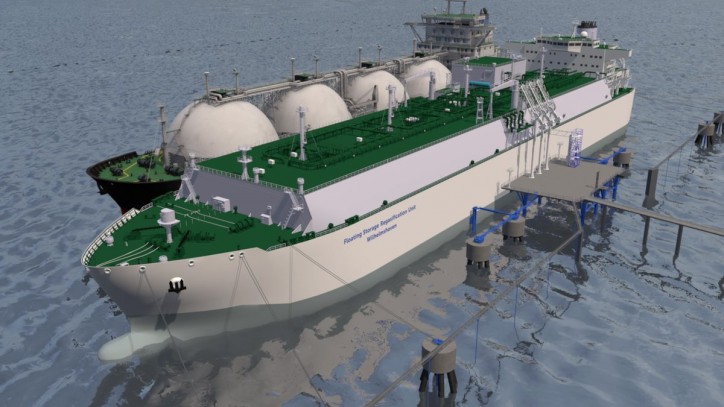- Seagoing vessels and trucks to be loaded at LNG terminal Wilhelmshaven
- LNG meets tightened environmental requirements for maritime transport
Uniper SE and the Dutch Titan LNG signed a Memorandum of Understanding to accelerate the growth of Liquified Natural Gas (LNG) as a fuel in the downstream markets for industry, road fuel and shipping fuel in Germany. The parties are planning to develop a user-friendly technical interface and commercial products for small-scale LNG players from the Wilhelmshaven Floating Storage and Regasification Unit (FSRU) for LNG. The terminal in Wilhelmshaven will enable the loading of small LNG seagoing vessels and barges. In addition, several truck loading bays are planned to enable the onward transport of LNG by road.

The distribution of LNG by truck from Wilhelmshaven is seen as an important impulse for the establishment of LNG as truck fuel. Numerous LNG filling stations are currently under construction in Germany. Compared to diesel, LNG will significantly reduce CO2 emissions. In addition, no particles will be emitted and nitrogen and sulfur oxide emissions will be greatly reduced. The German Federal Government supports logistics companies with subsidies and the toll-free use of German roads for LNG-powered trucks.
With its proximity to the Jade Weser Port, Bremerhaven and the German Bight, Wilhelmshaven is a very suitable location to supply LNG for all downstream markets and in particular for marine fuels. The market for so-called small-scale LNG is gaining in importance due to its proven economic benefits. As a fuel, LNG already meets the more stringent environmental requirements for ocean shipping.
Keith Martin, Member of the Executive Board and Chief Commercial Officer of Uniper SE: "The agreement with an experienced and established market player in the small-scale LNG sector such as Titan LNG is another important step for the FSRU Wilhelmshaven project. Titan LNG has extensive know-how in the development of attractive products for customers in this segment. With Wilhelmshaven, we offer a first-class location for supplying the shipping and road fuel markets with LNG. With this cooperation, the FSRU Wilhelmshaven project can make an important contribution to reducing CO2 and pollutant emissions".
Niels den Nijs, Chief Executive Officer of Titan LNG: "Titan LNG is pleased that we can contribute the know-how we have built up over the last six years to this project for the LNG downstream market. We believe that the short distances to the markets will help to boost LNG as a fuel. Our existing and future customers will benefit from the economic and environmental advantages of this fuel."
Titan LNG and Uniper have been leading suppliers in the small-scale LNG market segment for years. Uniper is currently developing a Floating Storage and Regasification Terminal (FSRU) at its Wilhelmshaven site. The FSRU will have a natural gas send-out capacity of 10 billion cubic meters per year and an LNG storage capacity of more than 263,000 m³. The terminal is scheduled to go into operation in the second half of 2022. In Wilhelmshaven, Uniper can use existing infrastructure. It is the only German site with a deep-water port and can be reached without tidal constraints. In addition, Wilhelmshaven is ideally located with regard to the existing pipeline and gas storage infrastructure.
FSRU technology is often used in the LNG industry. Compared to an onshore facility, a FSRU can be built faster and more cost-effectively, reducing risks during the construction phase.
In December 2018, Uniper signed a memorandum of understanding with the Japanese shipping company Mitsui O.S.K. Line (MOL). MOL will own, finance and operate the FSRU. Uniper is currently coordinating the permits for the operation of the facility with the relevant authorities.
Source: Uniper